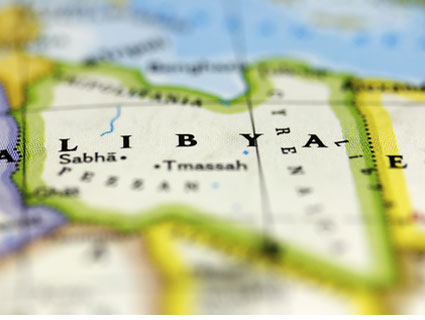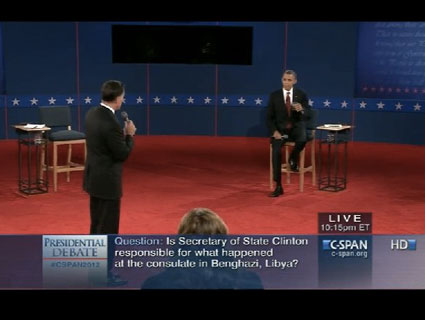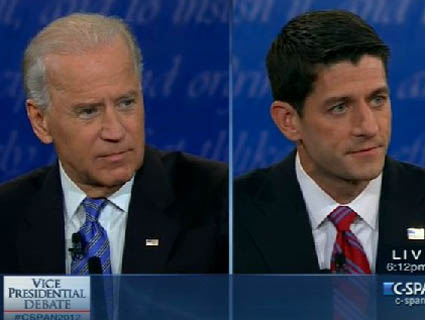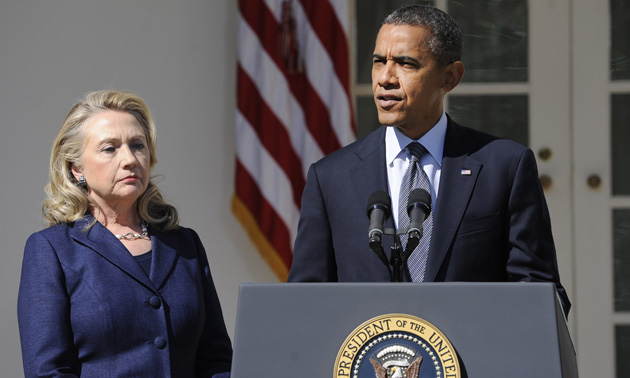
<a href="http://www.shutterstock.com/pic-85467844/stock-photo-libya-on-the-map.html?">Marcio Jose Bastos Silva</a>/Shutterstock
This story first appeared on the TomDispatch website.
Who lost Libya? Indeed, who lost the entire Middle East? Those are the questions lurking behind the endless stream of headlines about “Benghazi-gate.” Here’s the question we should really ask, though: How did a tragic but isolated incident at a US consulate, in a place few Americans had ever heard of, get blown up into a pivotal issue in a too-close-to-call presidential contest?
My short answer: the enduring power of a foreign policy myth that will not die, the decades-old idea that America has an inalienable right to “own” the world and control every place in it. I mean, you can’t lose what you never had.
This campaign season teaches us how little has changed since the early Cold War days when Republican stalwarts screamed, “Who lost China?” More than six decades later, it’s still surprisingly easy to fill the political air with anxiety by charging that we’ve “lost” a country or, worse yet, a whole region that we were somehow supposed to “have.”
The “Who lost…?” formula is something like a magic trick. There’s no way to grasp how it works until you take your eyes away from those who are shouting alarms and look at what’s going on behind the scenes.
Who’s in Charge Here?
The curious case of the incident in Benghazi was full of surprises from the beginning. It was the rare pundit who didn’t assure us that voters wouldn’t care a whit about foreign affairs this year. It was all going to be “the economy, stupid,” 24/7. And if foreign issues did create a brief stir, surely the questions would be about Afghanistan, Pakistan, or China.
Yet for weeks, the deaths of the US Ambassador to Libya, J. Christopher Stevens, and three other Americans became the rallying cry of the campaign to unseat Barack Obama. What made this even more surprising: when news of the tragedy first broke, it appeared to be stillborn as a political issue.
The day after the attack on the consulate, as the news about the killings was just coming out, Mitt Romney rushed to blast his opponent: “American leadership is necessary to ensure that events in the region don’t spin out of control.” A president must show “resolve in our might” and a readiness to use “overwhelming force.” Barack Obama had failed on all these counts, Romney charged, and the deaths in Benghazi proved it.
The Republican presidential candidate was duly blasted in return for “politicizing” the incident. It seemed like almost everyone chimed in critically. Even longtime Republican stalwart Ed Rogers wrote that “Romney stumbled,” while “the president said the right things and had the right tone.”
Romney never retracted anything he said on that first day—and somehow the same words, once scorned as unfitting and “unpresidential,” were mysteriously transformed into powerful arguments against reelecting the incumbent. A month later, a new story dominated the headlines: Romney’s criticisms on Libya were now said to be hitting the target, changing the dynamic, playing a major role in his campaign’s resurgence.
 This change of tune surely reflected in part the media’s primal need for a close presidential contest to keep the public’s interest. At the time of the Libyan incident it was generally agreed that Obama was beginning to pull ahead in the race, potentially decisively, and anything that might boost Romney’s chance was undoubtedly welcome on an editor’s desk.
This change of tune surely reflected in part the media’s primal need for a close presidential contest to keep the public’s interest. At the time of the Libyan incident it was generally agreed that Obama was beginning to pull ahead in the race, potentially decisively, and anything that might boost Romney’s chance was undoubtedly welcome on an editor’s desk.
No matter how hard editors try, though, some stories just don’t stick. But the Libya story stuck. It struck a chord somewhere in the hearts and minds of a lot of Americans. You have to wonder why.
A big part of the answer lies in the power of the key words in Romney’s first statement: “might” and “control.” His strategists grasped a fundamental truth of American politics: The public has an endless appetite for gripping stories about challenges to America’s global might and its right to control the world. So they doubled down and sent their man out to tell the story again.
In his first major foreign policy speech, Romney absolved his opponent of any direct responsibility for the four American deaths, but he pilloried Obama for a far more grievous sin. By a wild leap of imagination, he turned this one incident into the spearhead of a vast assault on America:”Our embassies have been attacked.Our flag has been burned… Our nation was attacked.”
The president’s job is to protect us by dominating our enemies, the challenger proclaimed. It’s our consistent record of victory as well as our values that make America “exceptional”—and on Obama’s watch, as the incident in Benghazi proved, America and its exceptionalism had gone down for the count.
This was not simply an exaggerated indictment of presidential “weakness.” As he had on that first day, Romney was again raising a question even more crucial to any popular narrative of American foreign policy: Who’s in charge here?
After all, what’s the point of being the global superpower if not to keep control of events around the world? As Romney put it succinctly: “It is the responsibility of our President to use America’s great power to shape history.” And on that most crucial count, he insisted, Obama had failed dismally and a US ambassador had paid for that failing with his life.
A Bipartisan Mythology
The debates gave Romney a chance to sharpen his attack. In the second of them, Obama deftly deflected the charges about Libya (though he never actually answered them). By the time the third debate rolled around, Romney’s strategists apparently saw no benefit and lots of risk in pressing the Libyan question. But they still saw plenty of benefit in keeping the broader issue alive. So Romney rushed past Libya, saying, “We’ve seen in nation after nation a number of disturbing events.”
He built his case using fearful images: “I see the Middle East with a rising tide of violence, chaos, tumult… You see al-Qaeda rushing in.” Power in Washington needed to be restored to the right hands so that, wearing “the mantle of leadership,” the US could “help the Middle East” turn back “the rising tide of tumult and confusion” and subdue the terrorists.
Translation: For decades nearly all the governments in the Middle East, the energy heartlands of the planet, were our allies (more precisely, our clients, though that word was never used in polite company). We could build up their militaries, support their autocratic regimes, and count on them to quell any expressions of anti-American sentiment. Now, under Obama, this crucial area of the world, once well under our thumb, was spinning out of control. Lose control by failing to exercise our might and we lose our safety.
Strength, control, and national security are all parts of the same package; nothing matters more to America—and Obama was letting it all go down the drain. So the Republican story went (with copious document leaks on the Libyan “cover-up” and the like from Congress). What had been considered an Obama strong suit—he was, after all, the man who took out Osama bin Laden—suddenly seemed to have been trumped.
The Democrats actually responded by putting out a remarkably similar story about (as the president termed it in the third debate) “strong, steady leadership,” which, they claimed, was preventing the Middle East from spinning out of control. In other words, we hadn’t really lost Libya at all. But that was the only point in dispute.
The debate between Republicans and Democrats wasn’t about goals in the Middle East, where support for autocratic friends like Saudi Arabia and Bahrain is assumed, and both sides agree on the need for democratic elections, religious pluralism, a free press, empowering women, strengthening free enterprise capitalism, and destroying Islamist terrorists.
More broadly, both sides agree, as they have for decades, that Washington’s overriding foreign policy goal must be to shape history, control the world, and make it mirror American values and serve American interests. This mythic vision of American foreign policy is a rare example of long-term bipartisan consensus.
When I call it myth, I don’t mean it’s a lie. I mean it’s a foundational narrative of American power that expresses our most basic assumptions about the world, a story in which every nation on the planet is, theoretically, ours to lose.
To most Americans (though not to much of the rest of the world), this narrative does not reflect sheer hubris and intoxication with imperial power. It’s just good common sense. Throughout our history, at the heart of the dominant national mythology has been the assumption that the US should be the world’s “locomotive” and all the other nations “the caboose” (as President Harry Truman’s Secretary of State, Dean Acheson, once said). The reason for this was simple (at least to Americans): we were the first and greatest nation founded on the universal moral truths that are supposedly self-evident to any reasonable person.
Sure, controlling the world would serve our self-interest in all sorts of tangible ways. However, our primary self-interest, so the myth maintains, always was and always will be the moral improvement—perhaps even perfection—of the entire world. By serving ourselves we serve all humanity.
The Fiercest Political Battle of All
The only question worth debating, then, is how we can use our preponderant power and wealth most shrewdly to maintain effective control. Most Americans expect their president to know the answer. At the same time, most Americans worry that he might not. A more recent pillar of the bipartisan narrative, the myth of homeland insecurity, suggests the opposite.
According to that myth, no matter how much military strength we have or control we exert, there is always “a rising tide of tumult” somewhere that threatens our national security. At every moment, somewhere in the world, we have something crucial to lose. The name of the threat can change with surprising ease. But the peril must always be there. It’s essential to the story.
And that story, in turn, is now essential to every presidential contest. As New York Times columnist Maureen Dowd once wrote, “Every election has the same narrative: Can the strong father protect the house from invaders?” (Think of Ronald Reagan and the Iran captivity tale or George W. Bush and 9/11.) If one candidate is the incumbent, the question becomes: Has he been a strong enough father to control the world and thereby protect the house?
Every challenger plays on that anxiety, picking the most obvious or convenient example of the day as a hook on which to hang the perennial charges of weakness and peril. Since the “Who lost China?” days, Republicans have played this card especially skillfully.
This year it seemed that a Democrat who “surged” in Afghanistan, killed bin Laden, and personally ran a drone assassination campaign from the White House had, for once, successfully protected his right flank against the predictable GOP attack. Then fate sent the Libyan killings to the Romney campaign, the newsrooms, and a big portion of the American public. Give Romney’s people credit: they sensed the opportunity from day one.
Mitt had to demand “Who lost Libya?” and then transform it into “Who lost the Middle East?”—not merely to boost his chances but because a big slice of the public yearns for such a “debate.” After all, every time the question of “Who lost [fill in the blank]?” arises, it reaffirms both the reassuring promise that we deserve to control the world and the disturbing anxiety that we might lose what is rightly ours.
What was, for all its tragic dimensions, a minor event in Libya became a central campaign issue because it proved to be this season’s code word for the whole mythological package. For many Americans, the deepest reassurance may come simply from sensing that our traditional mythology—the familiar lens through which we view our nation and its role in the world—is still intact.
On the horizon, though, we can dimly see a new question rising: How much longer can this mythology survive? It suffered a major wound in the Vietnam War era, when the fantasy of global control was rudely punctured by reality. That wound has been ripped open again by fruitless wars and conflicts in Iraq, Afghanistan, and elsewhere.
Now, there are so many unsettling changes around the world that we can’t predict, much less control, them. Soon enough—perhaps by 2020, or even 2016—the political battle cry may be: “Who lost the world?”
It’s even possible to imagine that someday Americans will engage in the debate we really need—about choosing a new paradigm for foreign policy that fits today’s world, where the fantasy of global control has become irrelevant because the facts so obviously contradict it, as American power declines while other nations steadily gain strength.
Don’t expect the old mythology to disappear quietly, though. Old myth versus new myth is the fiercest political battle of all.
Ira Chernus is Professor of Religious Studies at the University of Colorado at Boulder, a TomDispatch regular, and author of “Mythic America: Essays.” He blogs at MythicAmerica.us. To stay on top of important articles like these, sign up to receive the latest updates from TomDispatch.com here.
















